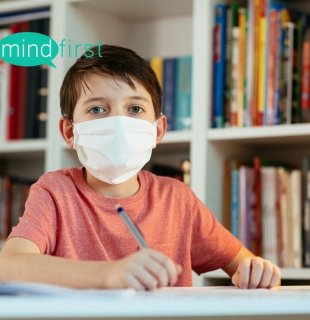Anxiety about returning to school. What to do?

It is normal for children to experience some anxiety as the start of the school year approaches. Younger children may be concerned because they are leaving their parents, while older children may be concerned about their studies, new colleagues, or even meeting friends after the summer months.
This year's schools are different. Teachers and students from the 2nd cycle onwards wear masks and interactions are limited. The uncertainty of the situation, the possibility of becoming ill, and changes in routines can cause stress and anxiety in many students and parents.
It is important to be aware of possible changes in your child's mood and behavior, anxiety can manifest itself in a variety of ways, including increased irritability, changes in sleep, loss of appetite, lack of concentration, lower energy, physical symptoms such as nausea, muscle tension or dizziness, refusal to attend school, sadness or crying.
The best way to assist your child if he exhibits any of these symptoms depends on his age. It does not help to avoid discussing COVID-19. It's critical to recognise the situation in an age-appropriate way.
- Communicate with your child frequently and listen to his concerns. Children may have many questions about wearing a mask for several hours, what happens if someone becomes ill with COVID-19, and whether they can play with their friends. It is critical to allow the child to ask all of the questions, to listen to them, and to give them space to express their fears. Make some unhurried time to give her your undivided attention. Be truthful about what you know and don't know. When you don't know something, admit it. You can tell older children that these are uncertain times and that even adults are learning the best ways to live so that we are all safe. To younger children, simply explain that you don't know everything and that adults don't always have all the answers, and that's okay.
- Help your child in focusing on what they can control in the fight against the pandemic, such as hand washing, wearing a mask, and practising social distancing.
- To maintain a healthy body and mind, make sure he gets enough sleep, is physically active, and eats healthy foods.
- Encourage your child to pursue his interests, whether they are reading, playing outside, or other activities.
- Explain to your child what you know about the school year or classroom to assist them in mentally preparing.
- Create a structured daily routine that includes sleep schedules.
- If possible, visit your child's school before the first day of school and allow them to meet the teacher in a social distancing situation.
- Help your child adjust to the precautions that must be taken by having him or her practise wearing a mask at home. It's natural for him to be uncomfortable, but explain that it's an important way for him to help protect others.
- Teach your child breathing exercises that he can do when he feels anxious.
- Leave positive or encouraging notes in his backpack.
If your child exhibits symptoms of anxiety and is having difficulty dealing with the situation, don't hesitate to seek professional help.
In these uncertain times, it is important for parents to take steps to take care of themselves. Talk with your child about your own feelings and coping mechanisms to deal with anxiety. One way to help your child is to model healthy behaviours and coping skills.
Teaching what it means to accept uncertainty—and showing that you can persevere despite that uncertainty—is teaching your child a lesson in resilience.
Cecilia Almeida
Clinical psychologist, Psychotherapist
2025 © MindFirst. All rights reserved. Developed by Fidelizarte.
